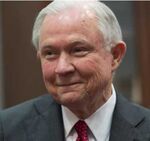UnNews:Sessions cedes Senate seat
| UnNews Audio (file info) | |
| Listen to this story! | |
Problems playing this file? You might be a dope. |
|
| Where man always bites dog | ✪ | UnNews | ✪ | Monday, March 2, 2026, 01:31:59 (UTC) |
| Sessions cedes Senate seat | 
|
10 December 2016
WASHINGTON, D.C. -- Jeff Sessions has been evicted from the U.S. Senate.
It began when over 20 marijuana activists entered the Russell Senate Office Building to "meet" with the Alabama Republican. As Donald Trump's nominee for Attorney General, he had to let them in, or else face accusations of being "closed-minded" about lawbreakers. However, two of the activists snuck the Demon Weed past Capitol Security.
Once inside the office, one of the activists rolled a joint. The Senator's communications director, Chris Jackson, passed on the policy proposals, but did not pass the joint. The episode was merely a prank all along, as Sen. Sessions did not call for Capitol Police to arrest the duo for bringing a Schedule 1 drug with no proven health benefits into the Rotunda, and the activists can now claim that any new move in the War on Drugs means the Senator has a "double standard" — or, worse yet, is a "hypocrite." Had he called the cops on his visitors, all Hell would have broken loose as well.
Unfortunately, as Sen. Sessions knew the pot smoking was occurring, he has lost his office, like any landlord would lose his business or parent would lose his home, under the principle of civil forfeiture. Thus, the office is no longer part of the U.S. Senate but of the Justice Department.
Mr. Jackson says the Senate is now obliged to confirm his boss as Attorney General, so he will have somewhere to sit. Forfeiture does not require a guilty verdict, and property forfeited by the innocent is generally never returned. However, Mr. Jackson says that having a bit of the Executive Branch inside the Legislative Branch will improve liaison between officials and could let both branches prosecute the War more efficiently than ever.
Sources[edit]
- Andrew Blake "Legal weed advocates sneak marijuana into Jeff Sessions’ Senate office". Washington Times, December 9, 2016
